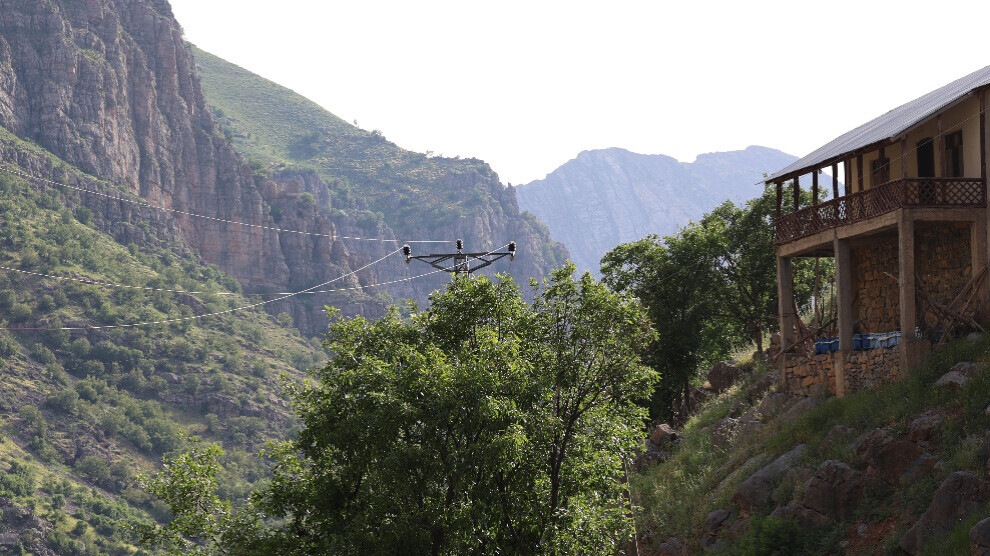Villagers protest tree cutting in Beytüşebap
Residents of Beşağaç say trees are vital to life and reject the cutting permit issued under the guise of “renewal and security.”
Residents of Beşağaç say trees are vital to life and reject the cutting permit issued under the guise of “renewal and security.”

Tree cutting, which has continued uninterrupted for seven years in the Besta, Cûdî, and Gabar regions of Şırnak (Şirnex), has now reached the district of Beytüşebap (Elkê). While logging continues across 31 designated zones in Besta, the Provincial Directorate of Agriculture and Forestry has sent official permits for tree cutting to the local headmen of nine villages in the Beytüşebap district.
When villagers refused to sign the documents, they were told: "We will cut them down whether you sign or not." Villagers who went to the District Gendarmerie Command for clarification were informed that the trees would be cut “for security reasons” and that the wood would be sold. Opposing the deforestation of their lands, the villagers submitted petitions to official institutions. As the ongoing logging operations continue to harm local communities and cause severe ecological destruction, the villagers have declared that they will resist the tree cutting.
Villagers submit petition against logging
One of the nine villages targeted for logging is Hemka (Beşağaç), located between two mountains about thirty minutes from the Beytüşebap district center. The village is home mainly to small and young trees. Originally depopulated in the 1990s and later rebuilt, the villagers now make their living through beekeeping and livestock breeding. With no other means of livelihood, the village is also exposed to avalanche risks due to its geographic location. In past years, multiple avalanches have occurred here, and heavy snowfall is common in winter.
The area that has protected villagers from avalanche disasters in recent years is largely covered by young trees. Villagers say that cutting these trees would not only destroy their only means of income but also expose them to deadly avalanche risks. Emphasizing their firm stance, they declared they stand by the petitions they submitted to authorities and strongly reject the planned deforestation.
Our means of survival will be destroyed
Ibrahim Acar, a 60-year-old resident of the village, stated that they have sustained life in the village for years through their own efforts. Acar expressed firm opposition to the planned deforestation and said: "They came last week and explained the situation. Our village head and the other village heads refused to sign. We, the villagers, also reject logging. We are able to live in this village thanks to these trees. They say it's for 'renewal,' but the trees in our village are already thin and young. There are very few old trees. Even if they claim it's for 'security,' we know very well these trees are going to be sold. Thanks to these trees, our animals survive, and so do we. If they are cut down, we will have no reason or means to stay here.
We would be forced, like everyone else, to migrate to the cities. But we cannot survive there either. That is why we want our trees to remain untouched. No one should cut them. We stand here, together with others from this village, against this destruction. We have shared our demands with the authorities. They must not take away our only source of life."
You cannot cut down trees in a village at risk of avalanches
Nihayet Acar, one of the villagers, pointed out that their trees were being targeted under the pretext of “security,” but that this justification brought no benefit to them.
Nihayet Acar explained that both the village and its livestock would suffer from deforestation and said: "If the trees are cut, the temperature will rise, and we will be left without any shade. Our animals will be left hungry and thirsty. Water resources will also diminish with the cutting. Beyond all that, this is an avalanche-prone area. Even though they say that particular zone won’t be touched, cutting in nearby areas will still worsen avalanche risks. As villagers, we reject this practice that would only harm us. Let them do something that actually benefits this village. Cutting down trees does not help anyone. We, the villagers, reject this deforestation, and we will protect our trees to the very end."